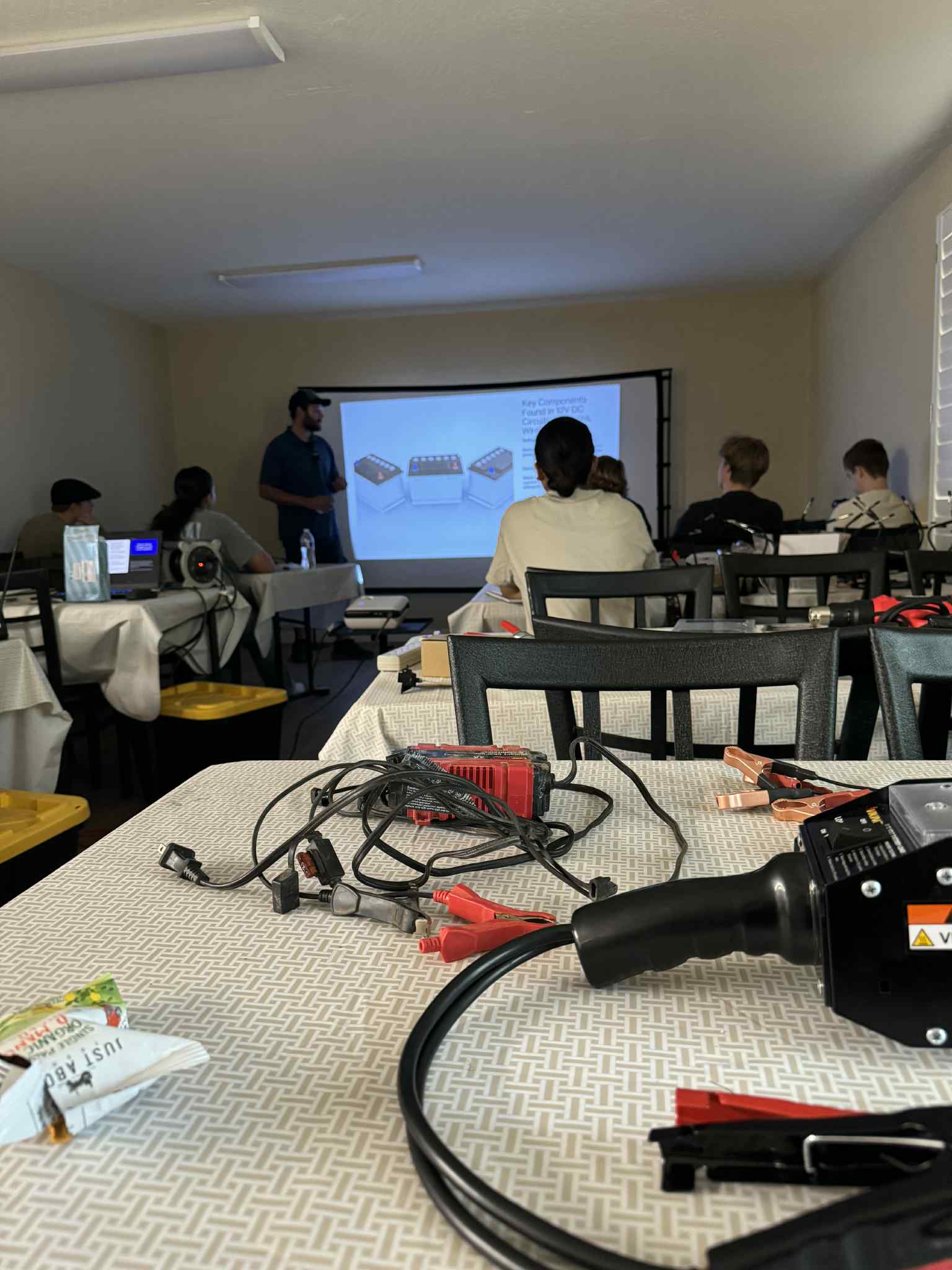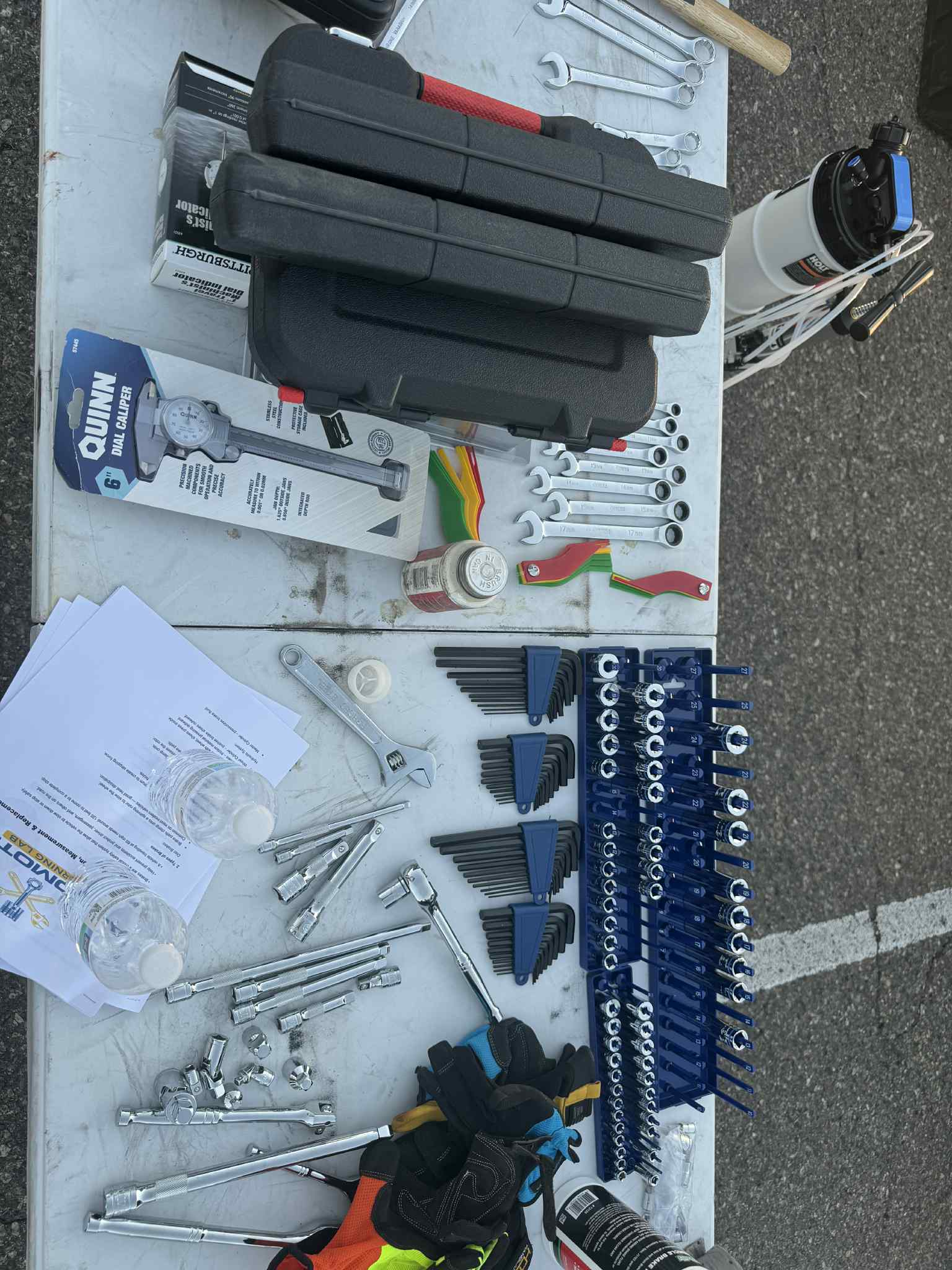Safety & Under-the-Hood Inspection Beginner
The starter class for new drivers. Learn safe habits around a running vehicle, then go under the hood to identify belts, hoses, battery, filters, fuses, and fluids. Practice simple checks and learn what needs attention now vs. later.
- Safety around heat/moving parts; hair/clothing safety
- Under-hood tour: belts, hoses, battery, air filter, fuse box
- Fluids: oil, coolant/overflow, brake, washer (top-off)
- Warning lights & “what to do” rules
Students leave able to: work safely, identify major components, perform basic checks, and know when to get help.
Ask About This Course
Engine Fundamentals Beginner
How engines make power, 2-stroke vs. 4-stroke, air/fuel/spark/compression, and real parts you can handle. Build a clear mental model of how an engine “breathes.”
- 2-stroke vs. 4-stroke cycle
- Identify major engine parts
- Fuel systems overview (carb vs. injection)
- Compression testing demo
Students leave able to: explain the cycle, name key parts, recognize basic fuel layouts.
Ask About This Course
Roadside Safety & Service Confidence Beginner
Know what to do during a breakdown and how to talk at the service counter. We practice safe pull-over steps, flat-tire basics, and how to read estimates and avoid unnecessary upsells.
- Breakdown protocol & visibility
- Flat-tire demo: jack points, lug pattern, tools
- Build a practical roadside kit
- Reading estimates & invoices, warranties, common upsells
Students leave able to: handle roadside issues, build a kit, and approve/decline work confidently.
Ask About This Course
Vehicle Electrical Systems — 12V Basics & DVOM Beginner
Demystify 12-volt systems. Learn power/ground, simple circuits, and DVOM usage for quick checks. Read basic wiring diagrams and track down simple faults.
- 12V fundamentals: series/parallel
- Lighting & fuses overview
- Using a DVOM safely
- Basic diagram symbols
Students leave able to: use a DVOM for simple checks and follow a basic circuit.
Ask About This Course
Brakes — Inspection, Measurement & Replacement Beginner
Inspect pads/rotors, measure wear precisely, and understand replacement steps, tools, torque, and safety.
- Pad/rotor inspection & wear patterns
- Micrometers/calipers to 0.0001"
- Torque & sequence basics
- Safety & tool overview
Students leave able to: evaluate wear, understand replacement steps, and discuss with a shop.
Ask About This Course
Drivetrain — Power to the Wheels Beginner
Follow power from engine to road: transmissions, driveshafts, differentials, CV joints, wear signs, and maintenance needs.
- Manual vs. automatic basics
- Axles, CV joints, driveshafts
- Differentials explained
- Common noises & symptoms
Students leave able to: explain parts and recognize wear/noise cues.
Ask About This Course
Cooling System Essentials Beginner
Radiators, pumps, thermostats, hoses, coolant types, leak checks, and overheating prevention.
- Radiator, pump, thermostat, hoses
- Coolant safety & types
- Leak checks & hose inspection
- Overheating causes & response
Students leave able to: identify parts, check hoses/coolant, and prevent overheating.
Ask About This Course
Under Car Inspection Beginner
Suspension, steering, exhaust, and safe lifting points. Spot issues before they become costly repairs.
- Suspension & steering basics
- Exhaust overview
- Safe jacking & lifting
- Bushings, leaks, and visible wear
Students leave able to: perform a safe under-car check and spot early issues.
Ask About This Course
Oil Change — Hands-On Service Beginner
Complete an oil & filter change with the right tools, torque, and disposal. Smaller class size due to tools/fluids and one-on-one coaching.
- Tools & safety gear
- Drain oil & replace filter
- Torque specs & tightening sequence
- Cleanup & proper disposal
Note: smaller class size · Teen $100 · Adult $150
Ask About This Course













